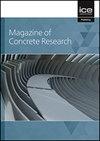Effects of hybrid metallic wastes on the strength and durability properties of cementitious mortars
IF 1.8
4区 工程技术
Q3 CONSTRUCTION & BUILDING TECHNOLOGY
引用次数: 0
Abstract
The amount of industrial waste is increasing along with industrial production. Therefore, reusing or recycling these harmful wastes is quite a significant issue for waste management. Concrete, the most widely used material in the world, is a suitable place to use these wastes. This study used grinding swarf, which had not been used in cementitious composites before, and metal shaving from the CNC milling process. The effects of these wastes on the strength and durability of cement mortars were investigated by using them separately and in hybrid forms. Flowability, fresh unit weight, compressive strength, flexural strength, water absorption, and high-temperature effect tests were conducted on mortar samples. Although the wastes contributed when used alone, they yielded the highest contribution when combined. When the waste materials were used in a hybrid form, they increased compressive strength, flexural strength, and high-temperature resistance by 29%, 12.98%, and 49.50%, respectively. Metal shavings showed fiber effects, and grinding swarfs improved the strength and durability properties owing to their physical and chemical composition.杂化金属废弃物对胶凝砂浆强度和耐久性的影响
工业废物的数量随着工业生产而增加。因此,这些有害废物的再利用或回收是废物管理中相当重要的问题。混凝土是世界上使用最广泛的材料,是利用这些废物的合适场所。本研究使用了之前未在胶凝复合材料中使用过的磨屑和CNC铣削过程中的金属剃须。通过单独使用和混合使用,研究了这些废弃物对水泥砂浆强度和耐久性的影响。对砂浆试样进行了流动性、鲜重、抗压强度、抗折强度、吸水率、高温效应等试验。虽然这些废物单独使用时产生了贡献,但它们合并使用时产生的贡献最大。当废料以杂化形式使用时,其抗压强度、抗弯强度和耐高温性能分别提高了29%、12.98%和49.50%。金属屑表现出纤维效应,磨屑由于其物理和化学成分而提高了强度和耐久性。
本文章由计算机程序翻译,如有差异,请以英文原文为准。
求助全文
约1分钟内获得全文
求助全文
来源期刊

Magazine of Concrete Research
工程技术-材料科学:综合
CiteScore
4.60
自引率
11.10%
发文量
102
审稿时长
5 months
期刊介绍:
For concrete and other cementitious derivatives to be developed further, we need to understand the use of alternative hydraulically active materials used in combination with plain Portland Cement, sustainability and durability issues. Both fundamental and best practice issues need to be addressed.
Magazine of Concrete Research covers every aspect of concrete manufacture and behaviour from performance and evaluation of constituent materials to mix design, testing, durability, structural analysis and composite construction.
 求助内容:
求助内容: 应助结果提醒方式:
应助结果提醒方式:


